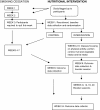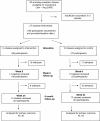Changes in body weight and food choice in those attempting smoking cessation: a cluster randomised controlled trial
- PMID: 22642755
- PMCID: PMC3490871
- DOI: 10.1186/1471-2458-12-389
Changes in body weight and food choice in those attempting smoking cessation: a cluster randomised controlled trial
Abstract
Background: Fear of weight gain is a barrier to smoking cessation and significant cause of relapse for many people. The provision of nutritional advice as part of a smoking cessation programme may assist some in smoking cessation and perhaps limit weight gain. The aim of this study was to determine the effect of a structured programme of dietary advice on weight change and food choice, in adults attempting smoking cessation.
Methods: Cluster randomised controlled design. Classes randomised to intervention commenced a 24-week intervention, focussed on improving food choice and minimising weight gain. Classes randomised to control received "usual care".
Results: Twenty-seven classes in Greater Glasgow were randomised between January and August 2008. Analysis, including those who continued to smoke, showed that actual weight gain and percentage weight gain was similar in both groups. Examination of data for those successful at giving up smoking showed greater mean weight gain in intervention subjects (3.9 (SD 3.1) vs. 2.7 (SD 3.7) kg). Between group differences were not significant (p = 0.23, 95% CI -0.9 to 3.5). In comparison to baseline improved consumption of fruit and vegetables and breakfast cereal were reported in the intervention group. A higher percentage of control participants continued smoking (74% vs. 66%).
Conclusions: The intervention was not successful at minimising weight gain in comparison to control but was successful in facilitating some sustained improvements in the dietary habits of intervention participants. Improved quit rates in the intervention group suggest that continued contact with advisors may have reduced anxieties regarding weight gain and encouraged cessation despite weight gain. Research should continue in this area as evidence suggests that the negative effects of obesity could outweigh the health benefits achieved through reductions in smoking prevalence.
Figures
References
-
- Department of Health (2004) Choosing Health: making healthy choices easier. http://www.dh.gov.uk/PublicationsAndStatistics/Publications/Publications...
-
- Statistics on obesity, physical activity and diet: England. http://www.ic.nhs.uk/webfiles/publications/003_Health_Lifestyles/opad11/... 2011.
-
- Scottish Health Survey. http://www.scotland.gov.uk/Resource/Doc/358842/0121284.pdf 2010.
Publication types
MeSH terms
Associated data
LinkOut - more resources
Full Text Sources
Medical



